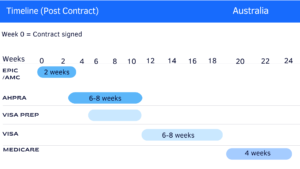Why GPs Are Choosing the Mornington Peninsula in Victoria
At Transition Medical, we’ve helped hundreds of GPs relocate across Australia and New Zealand , and while the cities often get the spotlight, it’s often the slightly less obvious places that offer the best balance of lifestyle, location and community.
One of our firm favourites? The Mornington Peninsula, a beautiful stretch of coastline and hinterland that combines the charm of bayside living with surprising proximity to Melbourne’s CBD. From suburbs like Seaford, it’s just a 45-minute drive into the city, making it one of the few DPA-approved regions that offers genuine commuter access without compromising on environment, safety or schools.
Location without compromise
This part of Victoria offers something many relocating GPs are seeking, a relaxed, family-friendly lifestyle without being removed from major centres. While the western growth corridors around Werribee and Melton are often promoted due to easier DPA access, the DPA boundary on the eastern side starts just south of Seaford, opening the door to beautiful, well-established suburbs that are closer to the CBD than many expect.
Once you’re past Seaford and into the Peninsula proper, the scenery shifts, think wineries, clifftop homes, olive groves and walking trails, yet you’re still comfortably within reach of Melbourne when needed. Suburbs like Mount Eliza, Mornington and Mount Martha offer a safe, affluent and picturesque setting, with strong local infrastructure and consistent GP demand. For many doctors and their families, it’s this combination of professional opportunity and lifestyle upside that stands out.
Culture, schools and community
The Peninsula has long appealed to professionals, families and retirees, especially those moving from Melbourne seeking a better balance. There’s a wide choice of schools (both public and private), including highly regarded options in Mornington and Mount Eliza, as well as childcare, healthcare and recreation facilities.
The area also supports a growing cultural scene, with weekend markets, boutique art galleries, family-run wineries and outstanding local produce. Community life is active and welcoming, and many towns on the Peninsula offer strong connections through sports clubs, surf lifesaving, and local festivals. It’s the kind of environment where patients know their GPs, and families tend to settle for the long haul.
What’s life really like as a GP here?
Practices across the Peninsula vary widely, from longstanding family-run clinics to larger modern medical centres with nursing and allied health teams. GPs who live locally often comment on the manageable patient load, supportive work environment, and ease of integrating into the community. For those relocating with families, the daily rhythm is often far more sustainable than what they’re used to in busier urban areas.
Lifestyle-wise, the Peninsula offers easy access to walking tracks, beaches, parks and wine country, all on your doorstep. From lunch breaks overlooking the bay to weekend trips through Point Nepean National Park or the Peninsula Hot Springs, there’s no shortage of ways to enjoy your time off. And with many suburbs just 45–60 minutes from central Melbourne, GPs can comfortably combine city and coastal living.
Not far away — just better balanced
For GPs moving from the UK or Europe, this part of Victoria often captures what they hoped Australia would offer, a warmer, more outdoors-oriented life with good schools, a strong healthcare system, and easy access to both city and sea. The Peninsula isn’t a compromise, it’s a more balanced version of urban living, where commutes are shorter, weekends are calmer, and the natural surroundings do more of the heavy lifting when it comes to wellbeing.
So whether you’re paddle boarding before clinic, grabbing a coffee in Mornington, or catching the train into Melbourne for a Friday meeting, the Mornington Peninsula offers a lifestyle that’s both connected and quietly aspirational, and still fully accessible under current DPA rules.
Local highlights worth exploring
One of the perks of living and working on the Mornington Peninsula is having some of Victoria’s most scenic and relaxing spots right on your doorstep. Whether it’s a quiet walk after clinic or a weekend outing with family, the area offers plenty to explore:
– Peninsula Hot Springs – A must-visit geothermal bathing retreat in Fingal, ideal for unwinding after a long day.
– Mount Martha Beach – Crystal-clear waters, colourful bathing boxes, and calm swimming conditions.
– Arthurs Seat Eagle – A gondola ride offering sweeping views across the bay and hinterland, perfect for kids and visitors.
– Point Nepean National Park – Coastal hikes, historic forts and panoramic views at the tip of the Peninsula.
– Red Hill wineries – Over 50 cellar doors and vineyard restaurants scattered through rolling countryside.
– Sorrento village – A heritage-rich seaside town with boutique shops, bakeries and cafes.
– Cape Schanck Lighthouse Reserve – Dramatic cliff walks and one of the best coastal photo spots in the region.
– Mornington Racecourse Market – A vibrant local market held monthly with food trucks, handmade goods and music.
Living here means these kinds of places aren’t something you need to book a trip for — they become part of your weekly rhythm. Whether you’re active and outdoorsy or prefer a lazy brunch with a sea breeze, the Peninsula offers the kind of lifestyle that many imagine when they first picture Australia.
Closing
If you hadn’t considered the Peninsula before, it’s well worth adding to your shortlist. We’ve helped GPs relocate to practices all over the region , rom Seaford down to Sorrento and the feedback is almost always the same: “We wish we’d moved sooner.”
If you’d like to know what’s currently available or want to explore options in the area, feel free to get in touch.
Further Reading
Australian GP Salary Calculator
What GPs Can Prepare Before Speaking To A Recruiter


